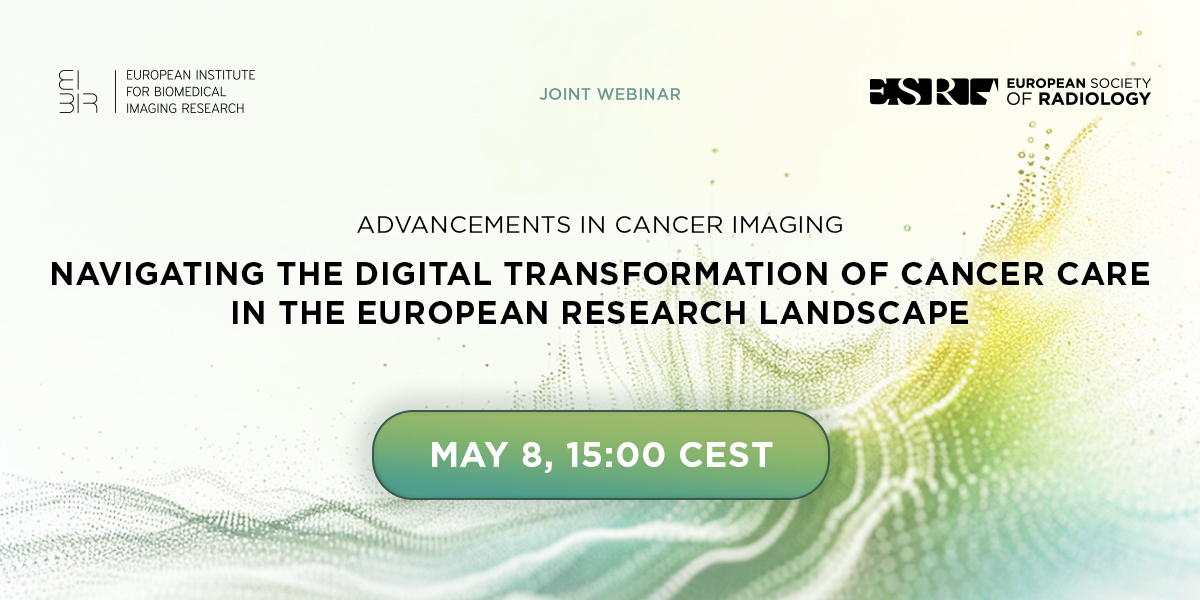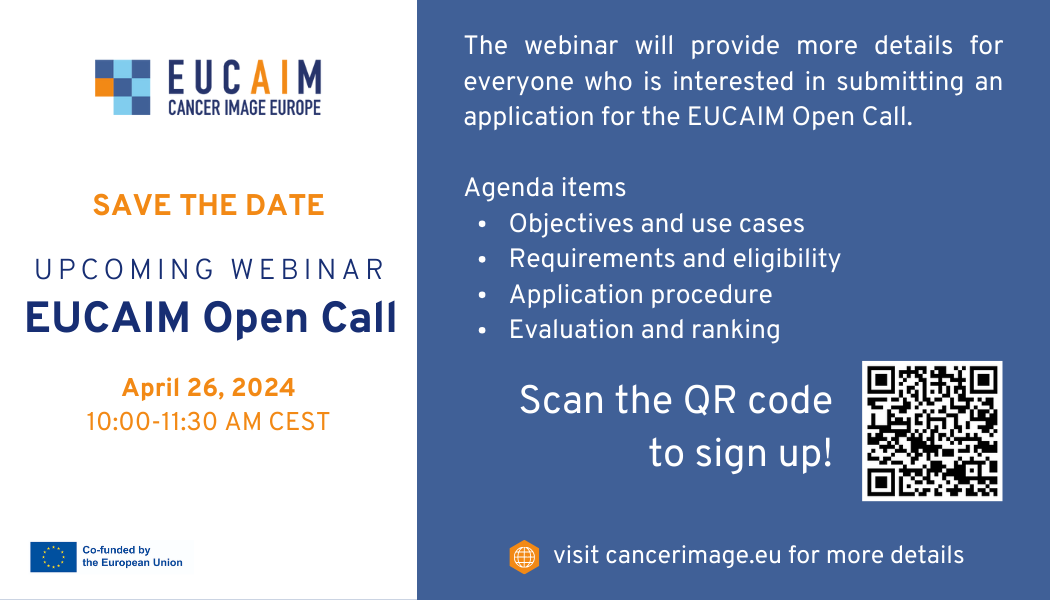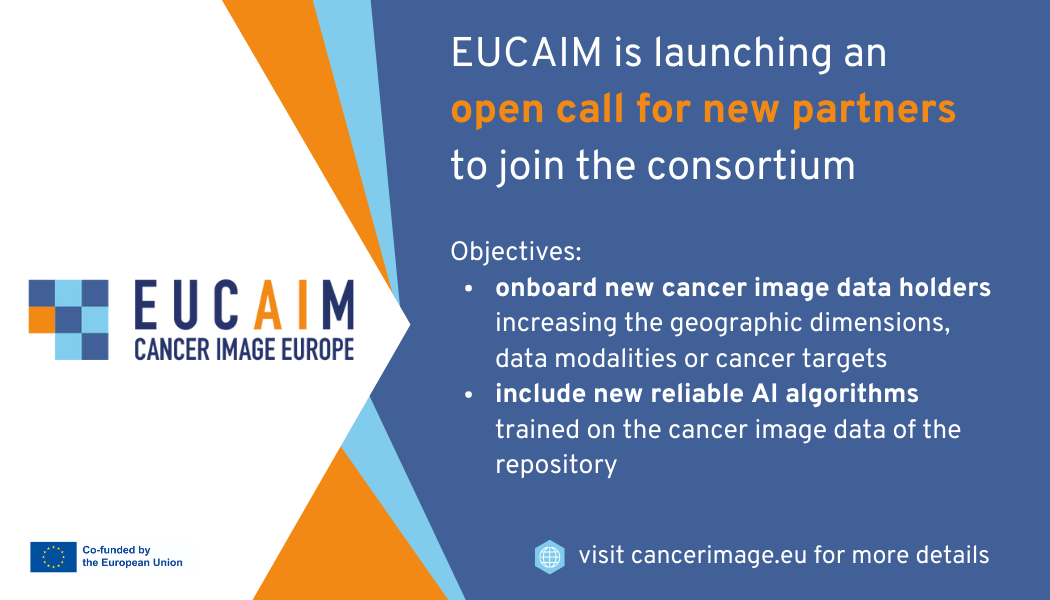Register today for the MARLIN study workshop (Brussels, 5–6 Sept.)
EIBIR, the European Society for Radiotherapy and Oncology (ESTRO), and the European Federation of Organisations for Medical Physics (EFOMP) have since January 2023 spearheaded the SAMIRA study on reporting and learning from patient-related incidents and near misses in radiotherapy, interventional cardiology, nuclear medicine and interventional and diagnostic radiology, or MARLIN project. The study has collected and analysed information on the implementation of Council Directive 2013/59/Euratom (Basic Safety Standards Directive or BSSD) requirements for reporting and learning from patient-related incidents and near misses in these five clinical areas and developed best-practice consensus guidelines on the implementation of the BSSD. Thus, MARLIN aims to stimulate further national and EU-wide efforts in this area.
As the project nears completion, the consortium will present its results and recommendations at a workshop at the BluePoint Brussels on 5–6 September 2024, and stakeholders in the regulation, implementation and operation of incident learning systems from clinical facilities, competent authorities and professional societies are kindly invited to discuss the relevant issues.
- The workshop begins at approximately 13:00 on Sept. 5 and ends approximately at 16:00 on Sept. 6
- The draft programme is available on the project website
- Registration: Participation is free of charge, but registration is required using an online form by Sunday, June 30. Onsite attendance will be confirmed by email following completion of the registration form, as seats are limited.
- Participants are responsible for their travel and hotel arrangements and related costs.
The workshop will bring together the following groups.
- National competent authorities
- National health authorities
- European and national professional societies
- European and international bodies such as the European Commission and Heads of the European Radiological Protection Competent Authorities
- European and international experts in the field
- Patient representatives
- Industry
- SAMIRA SGQS and article 31 WP MED
We look forward to your participation and feedback on the project’s work!
….
This project has received funding from the European Commission under Service Contract N° ENER/2022/NUCL/SI2.880751.
ESR and EUCAIM achieve top votes for Thematic Network on Precision Medicine
Under the leadership of the European Society of Radiology (ESR), in collaboration with the European Federation for Cancer Images (EUCAIM), we are delighted to announce that the proposal for the thematic network titled “Advancing Precision Medicine for Europe’s Cancer Patients with AI-powered Imaging” has been successfully accepted. This proposal received the highest number of votes among all submitted initiatives, marking a significant achievement for our collaborative efforts.
The proposed thematic network aims to leverage data and digital technologies, including artificial intelligence, to develop more personalized and effective treatment strategies for cancer patients. Furthermore, the network builds upon the groundwork laid by EUCAIM, aiming to better integrate AI-powered imaging with other diagnostic tools and data with the goal to facilitate the integration of comprehensive diagnostics into clinical practice, thereby contributing to the implementation of Europe’s Beating Cancer Plan, the EU Cancer Mission, and the broader digital health agenda. Additionally, it addresses the implications of the new legislative landscape in digital health, particularly the AI Act and the European Health Data Space (EHDS).
For further information, please read ESR’s press release.
Join us for the Live Webinar on June 24th
To learn more about this exciting proposal, we invite you to join the EUHPP Live Webinar on June 24th, 2024. During this webinar, the 2024 Thematic Network leaders will present their proposals to the public. This pitch webinar will also provide an opportunity for you to ask questions and meet the leaders virtually.
Webinar Details:
- Date: June 24, 2024
- Time: 10:00-12:00 CEST
- Registration Link: click here
We look forward to your participation in this webinar!
Now available: recording of the ESR/EIBIR webinar on advancing cancer research
We are delighted to share with our community the recording of our successful webinar hosted by EIBIR in collaboration with ESR, focusing on the impact of cancer imaging research and digital transformation of healthcare.
The webinar aimed to delve into the intersection of cancer imaging research and digital healthcare, spotlighting digital infrastructures, AI and lung cancer screening. With participation from leading experts, it fostered discussions on the latest advancements, challenges and opportunities in this dynamic field.
700 participants from around the world joined us for this important webinar, contributing to its success. EIBIR extends its sincere gratitude to all participants, speakers and collaborators. The agenda featured insightful presentations and an interactive panel discussion.
Welcome and Introduction by Regina Beets-Tan
The European Institute for Biomedical Imaging Research – What Does EIBIR Hold for You? by Regina Beets-Tan
Harnessing AI for Cancer Imaging in the Era of Digital Transformation by Luis Marti-Bonmati
Advancements in Lung Cancer Screening by Hans-Ulrich Kauczor
Interactive Panel Discussion moderated by Regina Beets-Tan
The webinar’s resounding success reaffirms our commitment to hosting more insightful events in the future, advancing knowledge exchange and collaborating in the field of biomedical imaging research. Stay tuned for upcoming events and initiatives from EIBIR and ESR!
📢 Vote and support the proposal of the European Society of Radiology and EUCAIM titled “Advancing Precision Medicine for Europe’s Cancer Patients with AI-powered Imaging”

The European Commission has initiated a voting poll to inaugurate a new cycle of Thematic Networks under the EU Health Policy Platform.
Under the leadership of the European Society of Radiology (ESR), in collaboration with the European Federation for Cancer Images (EUCAIM), a proposal for a new thematic network titled “Advancing Precision Medicine for Europe’s Cancer Patients with AI-powered Imaging” has been submitted for consideration within the public health area of “Unlocking the power of artificial intelligence against cancer”.
This initiative aims to transform cancer care by seamlessly integrating AI-powered imaging with other diagnostic tools and data, enhancing the implementation of Europe’s Beating Cancer Plan and the EU Cancer Mission.
Help make a difference by casting YOUR VOTE for this proposal on the Health Policy Platform’s Agora Network!
⏳ Deadline: May 21st
More information about the voting process and proposal here
Free workshop in Rotterdam! EuCanImage: Trustworthy Artificial Intelligence in Multi-Country Cancer Imaging
EuCanImage is hosting a free workshop on AI in multi-country oncology, not only from technical, but also clinical perspective. Additionally, attendees will gain practical experience with the EuCanImage data collection and the platform for individual studies during a hands-on session. The workshop is tailored for clinical and technical AI scientists keen on conducting their own multi-centre AI research.
When: 10 June 2024
Where: Rotterdam, Netherlands
Cost: Free of charge
Registration deadline: 27 May 2024
The workshop committee:
Martijn Stramans, Erasmus MC, Rotterdam, Netherlands
Maciej Bobowicz, Medical University of Gdansk, Poland
Karim Lekadir, University of Barcelona, Spain
Sign up here: https://forms.office.com/e/dm3fMeMAGq
More information about the workshop: https://eacr.org/conference/eucanimageworkshop2024/index
Read about EuCanImage: https://eucanimage.eu/
📢 Join ESR and EIBIR’s upcoming webinar on advancing cancer imaging research

We are thrilled to announce that EIBIR in collaboration with ESR will be hosting an insightful webinar focused on the significant impact of cancer imaging research and the digital transformation of healthcare.
This webinar aims to explore the intersection of cancer imaging research and the digital transformation of healthcare, with a focus on digital infrastructures, AI and lung cancer screening. By bringing together experts and stakeholders, we seek to foster discussions on the latest developments, challenges, and opportunities in this rapidly evolving field.
🎯 Target Audience:
- Healthcare professionals
- Researchers in medical imaging and oncology
- Industry professionals in healthcare technology and AI development
- Policy makers and healthcare administrators
📝 Agenda:
- Welcome and introduction (Regina Beets-Tan)
- The European Institute for Biomedical Imaging Research – what does EIBIR hold for you? (Regina Beets-Tan)
- Harnessing AI for Cancer Imaging in the Era of Digital Transformation (Luis Marti-Bonmati)
- Advancements in Lung Cancer Screening (Hans-Ulrich Kauczor)
- Interactive panel discussion (Moderated by Regina Beets-Tan)
📅 Date & Time: Wednesday, May 8th, 2024, 15:00 CEST.
🔗 Registration Link: https://form.jotform.com/241121290151339
⏳ Registration Deadline: Tuesday, May 7th, 16:00 CEST.
Don’t miss this chance to delve into the forefront of cancer imaging research with EIBIR and ESR! Register now to secure your spot and be part of this insightful discussion.
The webinar is officially accredited by EACCME® for 1 European CME credit. Each medical specialist should claim only those hours of credit that he/she actually spent in the educational activity.
European Commission’s amendment for the Horizon Europe work programme 2023-2024
The European Commission has recently announced a substantial increase in the budget allocated to the Horizon Europe Work Programme 2023-2024. The amendment sees a rise of almost EUR 1.4 billion, bringing the total budget to EUR 7.3 billion. This increase includes approximately EUR 124 million allocated specifically to support the EU Cancer Mission.
The amendment introduces six new Cancer Mission calls, which formally opened on April 18, 2024, and close on September 18, 2024. These calls target crucial areas of cancer research and treatment, ranging from enhancing data platforms to advancing early detection methods and improving the management of late-effects in adolescents and young adults with cancer.
Furthermore, the amendment introduces public procurement actions aimed at enhancing synergies with other EU missions, fostering international collaboration on cancer research, and ensuring effective communication and stakeholder engagement. These actions are backed by a budget of approximately EUR 5 million.
The Health cluster within Horizon Europe also introduces a new call focusing on Implementation research for managing multiple long-term conditions in the context of non-communicable diseases, with a budget of EUR 1 million.
For more information and details on the Horizon Europe Work Programme amendments, visit HaDEA’s website or the European Commission’s press release about the amendment.
For further information on relevant calls, visit our section Open Funding Calls.
2024 Horizon Europe call under the Mission Cancer is out!
Horizon Europe, the EU’s primary funding programme for research and innovation, has announced 6 calls for proposal under the Mission on Cancer, providing approximately €116 million to address this disease from prevention to treatment. This latest initiative will support improving our understanding of cancer, advancing prevention and early detection strategies, facilitating the delivery of personalised care, and enhancing the quality of life for patients and survivors.
Funding is available for 6 topics:
🔹 Use cases for the Uncan.eu research data platform
🔹 Support dialogue towards the development of national cancer data nodes
🔹 Accessible and affordable tests to advance early detection of heritable cancers in the EU
🔹 Support of pragmatic clinical trial programme by cancer charities
🔹 Improving the understanding and management of late-effects in adolescents and young adults with cancer
🔹 Information portal for the European Cancer Patient Digital Centre
The deadline for proposal submission for each call is September 18, 2024.
The HaDEA website provides more information with links to the call descriptions, and an online info day has been organised for April 26 to enable researchers to construct effective proposals for this great opportunity.
📢EUCAIM Webinar: Learn more about EUCAIM’s Open Call for new beneficiaries!

EUCAIM is excited to announce an upcoming webinar dedicated to providing more insights into their open call for new beneficiaries. This webinar presents a unique opportunity for individuals and organisations interested in contributing to cutting-edge cancer research and innovation to learn about joining the EUCAIM consortium. The open call is geared towards incorporating new data into the EUCAIM platform and training, benchmarking, and validating AI algorithms for cancer imaging.
During the webinar, participants will gain a comprehensive understanding of the open call process, including eligibility criteria, application requirements, application procedure, etc. Attendees will also have the opportunity to ask questions and interact with members of the EUCAIM team.
Don’t miss out on this valuable opportunity to learn more about the EUCAIM open call and how you can contribute to shaping the future of cancer imaging research. Mark your calendars and register now to secure your spot!
Date: April 26th, 2024.
Time: 10:00-11.30 AM CEST.
Location: Online webinar – Link will be sent to all registered participants in due course.
Webinar registration: https://form.jotform.com/240983490161054
Further information about the Open Call: https://cancerimage.eu/open-call/
EUCAIM launches Open Call for new consortium beneficiaries

The EUCAIM Consortium is thrilled to announce the launch of its open call, inviting new beneficiaries to join the EUCAIM consortium. This call is geared towards incorporating new data into the EUCAIM platform and training, benchmarking, and validating AI algorithms for cancer imaging.
The objectives of the EUCAIM open call are:
-
- to onboard new cancer image data holders, enhancing the platform’s geographic dimensions, data modalities, and cancer targets;
- to include reliable AI algorithms trained on the repository’s cancer image data.
To achieve these objectives, new beneficiaries will implement data incorporation, scientific, and/or clinical use cases. These use cases play a pivotal role in outlining technical, ethical, and legal steps, ultimately improving clinical outcomes and patient care.
The following use cases are accepted for this call:
-
- Incorporation of large amounts of cancer imaging data into the Cancer Image Europe platform for further re-use, which can be leveraged to address relevant clinical questions (either into the central repository or through the federation of local repositories)
- Development, training, benchmarking and/or validation of AI algorithms
- Clinical use cases addressing a specific question (e.g. identification of imaging biomarkers)
The prospective implementation duration for applicants is expected to be between 18-24 months, with a total maximum budget of 3,852,000 EUR (1,926,000 EUR EC contribution).
Deadline for submission is June 10th, 2024. Interested parties are encouraged to visit https://cancerimage.eu/open-call/ for further details on the open call. If you wish to apply, this is the link for the application form: https://form.jotform.com/240802834247354
Don’t miss this opportunity to contribute to advance cancer research and innovation!
